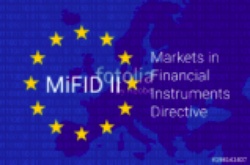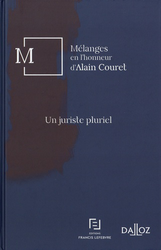Food for thoughts
Feb. 3, 2021
Teachings : Banking and Financial Regulatory Law - Semester 2021

Résumé de la leçon : L'Europe est avant tout et pour l'instant encore une construction juridique. Elle fut pendant longtemps avant tout la construction d'un marché, conçu politiquement comme un espace de libre circulation (des personnes, des marchandises, des capitaux). C'est pourquoi le Droit de la Concurrence est son ADN et demeure le coeur de la jurisprudence de la Cour de justice de l'Union européenne, qui tient désormais l'équilibre entre les diverses institutions, par exemple la Banque Centrale Européenne, dont les décisions peuvent être attaquées devant elle. Mais aujourd'hui le Droit de l'Union européenne se tourne vers d'autres buts que la "liberté", laquelle s'exprime dans l'immédiat, notamment la "stabilité", laquelle se développe dans le temps. C'est pourquoi la Banque y prend un si grande importance.
En outre, face aux "libertés" les "droits" montent en puissance : c'est par les institutions juridiques que l'Europe trouve de plus en plus son unité, l'Europe économique et financière (l'Union européenne) et l'Europe des droits humains (le Conseil de l'Europe au sein duquel s'est déployée la Cour européenne des droits de l'Homme) exprimant les mêmes principes. C'est bien à travers une décision prenant appui sur le Droit de la concurrence que la Commission européenne le 18 juillet 2018 a obligé Google à concrétiser le "droit d'accès" à des entreprises innovantes, apte à faire vivre l'écosystème numérique, tandis que le Régulateur financier doit respecter les "droits de la défense" des personnes qu'il sanctionne.
Aujourd'hui à côté de l'Europe économique se développe en même temps par des textes une Europe bancaire et financière (on ne sait pas si par le Droit - par exemple le droit de la propriété intellectuelle - existera une Europe industrielle).La crise a fait naître l'Europe bancaire et financière. L'Union bancaire est issue de Règlements communautaires du 23 novembre 2010 établissant des sortes de "régulateurs européens" (ESMA, EBA, EIOPA) qui donnent une certaine unité aux marchés financiers qui demeurent nationaux, tandis que les entreprises de marché, entreprises privées en charge d'une mission de régulation, continuent leur déploiement selon des techniques de droit privé. L'Union bancaire est née d'une façon plus institutionnelle encore, par trois piliers qui assurent un continuum européen entre la prévention des crises, la résolution des crises et la garantie des dépôts. En cela, l'Europe bancaire est devenue fédérale.
Sur les marchés de capitaux, des instruments financiers et des titres, l'Union européenne a utilisé le pouvoir que lui confère depuis la jurisprudence Costa et grâce au processus Lamfallussy d'une sorte de "création continuée" pour injecter en permanence de nouvelles règles perfectionnant et unifiant les marchés nationaux. C'est désormais au niveau européen qu'est conçu la répression des abus de marché mais aussi l'information des investisseurs, comme le montre la réforme en cours dite "Prospectus 3". A l'initiative de la Commission Européenne, les textes sont produits en "paquet" car ils correspondent à des "plan d'action " . Cette façon de légiférer est désormais emprunté en droit français, par exemple par la loi dite PACTE du 29 avril 2019. Cette loi vise - en se contredisant parfois - à produire plus de concurrence, d'innovation, à attirer l'argent sur des marchés dont l'objectif est aussi la sécurité, notion d'égale importance que la liberté, jadis seul pilier du Droit économique. Conçue par les but, La loi est définitivement un "instrument", et un instrument parmi d'autres, la Cour de Justice tenant l'équilibre entre les buts, les instruments et les institutions.
La question du "régulateur" devient plus incertaine : la BCE est plus un "superviseur" qu'un "régulateur" ; le plan d'action pour une Europe des marchés de capitaux ne prévoit pas de régulateur, visant un capitalisme traditionnelle pour les petites entreprises (sorte de small businesses Act européen)
Revenir à la présentation générale du cours
Se reporter au plan général du cours
Utiliser les matériaux ci-dessous pour aller plus loin et préparer votre conférence de méthode.
Feb. 2, 2021
Thesaurus : 05. CJCE - CJUE
Full reference: CJEU, 2nd of February 2021, DB v. Commissione Nazionale per le Società e la Borsa (Consob), case C‑481/19
Read the opinion of advocate general
Summary of the decision by CJEU:
"Natural persons who are subject to an administrative investigation for insider dealing have the right to remain silent when their answers might establish their liability for an offence that is punishable by administrative sanctions of a criminal nature, or their criminal liability".
To go further, read:
- Frison-Roche, M.-A., Resolve the contradiction between "incentive" and "sanction" under the fire of Compliance Law, 2021
- Frison-Roche, M.-A., Rights, primary and natural Compliance tools, 2021
Feb. 2, 2021
Thesaurus : Doctrine
► Référence complète : T. Sachs, J. Tricot, "La loi sur le devoir de vigilance : un modèle pour (re)penser la responsabilité des entreprises", Droit & Société, n° 106, 2020, p. 683-698.
____
► Résumé de l'article (fait par les auteurs) : Grâce à une ingénierie juridique très sophistiquée, les entreprises multinationales se jouent des frontières entre sociétés commerciales et entre États, parvenant ainsi à échapper à toute responsabilité. L’impuissance des États, qui devraient alors déléguer aux acteurs eux-mêmes le soin de développer des instruments de responsabilité sociale des entreprises, est-elle une fatalité ? Alors que certains voudraient confier la fabrication des normes de gouvernance aux acteurs, la loi sur le devoir de vigilance pourrait constituer un modèle d’une articulation originale et équilibrée entre hétéronomie et autonomie normative. Cet article entend mettre en lumière les caractéristiques de ce modèle, au moyen d’une confrontation de la loi sur le devoir de vigilance avec la loi Sapin 2 qui se présente comme son pendant tout en mobilisant d’autres leviers, ceux de la compliance.
____
🗒️Les étudiants inscrits au cours de Marie-Anne Frison-Roche peuvent accéder au texte de ces articles.
________
Feb. 2, 2021
Thesaurus : Doctrine
► Référence complète : L. d'Ambrosio, "Le devoir de vigilance : une innovation juridique entre continuités et ruptures", Droit & Société, n° 106, 2020, p. 633-648.
____
► Résumé de l'article (fait par l'auteur) : "Cette contribution analyse les origines de la notion de devoir de vigilance. A cette fin, elle reconstruit les rapports de filiation entre cette notion et celle de "due diligence", devenue ces derniers temps une notion clé pour caractériser la responsabilité des Etats et des entreprises concernant les atteintes graves a des valeurs protégées par le droit international (environnement, santé, droits de l'homme, etc.). L'article vise ainsi à repérer les lignes de continuité ainsi que celles de rupture qui marquent l'introduction et la traduction du devoir de vigilance dans le système juridique français : les unes comme les autres permettront en effet de présenter les contours de cette innovation juridique et d'en saisir la portée dans le cadre du plus large processus d'institution d'une responsabilité juridique des entreprises dans l'horizon de la globalisation."
________
Feb. 2, 2021
Thesaurus : Doctrine
► Référence complète : A. Hatchuel, B. Segrestin, "Devoir de vigilance : la norme de gestion comme source de droit ?", Droit & Société, n° 106, 2020, p. 667-682.
____
► Résumé de l'article (fait par les auteurs) : La loi sur le devoir de vigilance introduit un mécanisme de responsabilisation atypique et insuffisamment conceptualisé. En faisant porter l'obligation des sociétés sur l'élaboration d'une gestion prévisionnelle des risques tout au long de la chaîne d'approvisionnement, la loi recourt à une "norme de gestion". L'article analyse les fondements de cette notion et montre qu'elle a été mobilisée à plusieurs reprises dans l'histoire du droit, pour accompagner les dynamiques de l'entreprise et responsabiliser ses relations avec les sociétés et les États. Il montre que le droit puise dans les connaissances et les méthodes en gestion de chaque époque, pour qualifier ce qu'est une action collective raisonnablement responsable, c'est-à-dire une action qui limite les risques encourus par les parties concernées. Prendre en compte les normes de gestion permet de repenser le statut des dirigeants et la responsabilité des entreprises. Cela ouvre aussi des perspectives théoriques nouvelles pour les sciences sociales.
________
Jan. 29, 2021
Thesaurus : Juridictions étrangères diverses
► Référence complète : Gerechtshof Den Haag (Cour d'appel de La Haye), 29 janvier 2021, aff. C/09/365498, HA ZA 10-1677 et C/09/33089, HA ZA 09-0579, Milieudefensie, Fidelis Ayoro Oguru, Alali Efanga. c/ Shell Petroleum N.V.
____
🏛️lire la décision (en anglais)
________
Jan. 20, 2021
Adventures of the Ogre Compliance

► Référence complète : Piana, E. et Utho, P., Henry, Beau Fifi et l'Ogre Compliance, coll. "Les Aventures de l'Ogre Compliance", 2020, The Journal of Regulation & Compliance (JoRC), 2021, 67 p.
____
🛒 cette collection est utilisée dans les structures pour diffuser une culture de compliance. Pour plus d'information, contacter le Journal of Regulation & Compliance
____
📚 Cet ouvrage est le premier de la collection créée par Marie-Anne Frison-Roche au sein du Journal of Regulation & Compliance (JoRC)
📘Le livre en anglais est sous presse.
📙📒 📗Les traductions en espagnol, allemand, portugais et italien sont en cours
📚Les prochains volumes paraitront dans les mois à venir. L'aventure de l'Epervier Vigilance est sous presse : L'Epervier Vigilance et le pays au nom oublié.
____
► Présentation de la collection : Sous la direction du professeur Marie-Anne Frison-Roche, le Journal of Regulation & Compliance (JoRC) publie de l’information technique sur le Droit économique, de la Régulation et de la Compliance. Parce que cette matière paraît souvent inaccessible, réservée aux spécialistes, mais aussi très ennuyeuse ! Marie-Anne Frison-Roche lance une collection : Les Aventures de l’Ogre Compliance.
Même un enfant peut y comprendre la lutte contre la corruption, le lancement d’alerte, les conflits d’intérêts, la gouvernance de l’espace digital, la protection de l’environnement, les techniques de règlements des différends. Mais pour cela, il faut affronter le terrible Ogre Compliance… Peut-être Beau Fifi viendra-t-il à l’aide du lecteur de tout âge ?
____
► Présentation de l'ouvrage par sa quatrième de couverture :
Tout le monde a peur de l’Ogre Compliance !
Il est énorme, il crie, il menace et l’on ne comprend rien à ce qu’il dit.
Il arrive ! Il entre et va bientôt enfermer Henry dans une cage !
Peut-être toutes les souris cachées sous le tapis peuvent-elles protéger le petit Henry ?
Henry a très peur. Jusqu’au jour où il rencontre le merveilleux Beau Fifi.
À partir de ce jour-là, Henry ne s’ennuie plus. Il fabriquera des jouets encore plus beaux, il ira se promener à travers le monde.
Mais si, en chemin, Henry rencontre le crapaud doré Corruption, que lui dira-t-il ?
► Les articles publiées :
►au regard de son innovation pédagogique :
📝lire dans Actu-Juridique "Les aventures de l'ogre Compliance, ou le droit expliqué sous forme de conte"
► au regard de son intimité entre le Droit et la Littérature :
📝 la revue Droit et Littérature a publié dans son numéro 2021 un premier article sur l'idée même de la collection ; un second article paraîtra dans le numéro suivant sur le premier ouvrage.
► au regard de son apport dans le Droit économique :
Dans sa version anglaise à paraître, l'ouvrage a été nominé en 2021 par la revue Concurrences dans ses Antitrust Compliance Awards au titre de son caractère innovant.
____
____
► Quelques réactions personnelles à ce premier ouvrage de la Collection des Aventures de l'Ogre Compliance :
 💬 "Je me glisse avec discrétion et réagis tout de suite, avant tous les autres, car c'est bien moi qu'il faut croire ! Moi, Crapaud Doré Corruption, je vous assure bien qu'il est tout à fait inutile de lire ce livre ! Il n'a aucun intérêt ! Je vous invite plutôt à boire avec moi, - c'est ma tournée, j''ai plaisir à vous inviter, c'est "free lunch", je vous offre ce que vous voulez, vous m'êtes si sympathique ! - , et nous parlerons des tracas de la journée, des moyens simples de les alléger, croyez-moi bien, je suis votre ami. Ne perdez pas votre temps à lire ce bouquin (à quoi ça sert les livres ...), venez donc plutôt me voir ..."
💬 "Je me glisse avec discrétion et réagis tout de suite, avant tous les autres, car c'est bien moi qu'il faut croire ! Moi, Crapaud Doré Corruption, je vous assure bien qu'il est tout à fait inutile de lire ce livre ! Il n'a aucun intérêt ! Je vous invite plutôt à boire avec moi, - c'est ma tournée, j''ai plaisir à vous inviter, c'est "free lunch", je vous offre ce que vous voulez, vous m'êtes si sympathique ! - , et nous parlerons des tracas de la journée, des moyens simples de les alléger, croyez-moi bien, je suis votre ami. Ne perdez pas votre temps à lire ce bouquin (à quoi ça sert les livres ...), venez donc plutôt me voir ..."
Lire quand même ci-dessous d'autres réactions car peut-être ne faut-il pas croire le Crapaud Doré Corruption : 🔻
anouk.leguillou@mafr.fr
01.53.59.98.31
Updated: Jan. 14, 2021 (Initial publication: Dec. 14, 2020)
Conferences

► Full Reference : Frison-Roche, M.-A., The Economic Attractiveness of Impartiality ("L'attractivité économique de l'impartialité"), in ""Economic Attractiveness, Judge Office and Impartiality. Thinking the judge Office" ("L'attractivité économique, l'office du juge et l'impartialité. Penser l'office du juge"),
____
🎥 watch the conference (in French with English subtitles)
____
📝 read the colloquium program ( in French)
📝 see the general program of the cycle on the Judge Office.
____
📝 read François Ancel's article of 14th of January 2021 in the Receuil Dalloz and which report this colloquium (in French)
📝 read the Working Paper, basis of this conference.
This Working Paper is significantly different from the conference because it was conceived befor the colloquia cycle beginning. In addition, since this manifestation was a Round Table, the conference has taken more into account previous conferences and what said the other two speakers.
📊 see the slides, basis of the conference (in French)
The slides could not be shown during the conference. Orally, it was appropriate to more develop the introductory remarks for emphasizing the human and unique dimension of the Judge Office, expected in economic matters. As a result, the second part of the conference was not given orally, so slides therefore remain the only media available.
____
► Summary of the conference : To fit into the ambition of this general colloquia cycle, which is to "Think the Judge Office" and in this round table which apprehends the imperative of economic attractiveness of this office, firstly emerges the seemingly contradictory relationship between this imperative and the distance that the judge must maintain. Thus it is often asserted that the judge should be internalized at this point in the "places", - an economic concept of great scope (to which the first part of the introduction is devoted, defining the "place" at the same time as a closed and porous space and as a "systemic litigant" -, that he/she should ipso facto lose his/her distance, that is to say his/her impartiality. As places are in competition, even if weighing on one hand the effectiveness of the place, and on the other hand the impartiality of a judge who is external to this place - Judge referring to the Law , Impartiality would necessarily emerge weakened. It would then be necessary on a case-by-case basis to get the judge to give the desired concessions...
The conference aim is to take the opposite position and to state that the Place - in particular because they must be strongly distinguished from the Markets, of which they were the ancestors - require a Judge, who is at the same time "singular", that is to say with a personality, a face, opinions, and in distance so that his/her imagination does not surprise Place. Indeed, these require a human Justice, and a not mechanical one and singular judges, of whom the juge des référés or the arbitrator are the epigone, meets this need. But for reducing their "margins of discretion", how Economy qualifies the Impartiality of a person who can never be neutral, the singular Judge's Office must be inserted into mechanisms reducing these margins. In this way, the Place may reach a Judge who is always more impartial, and in doing so the Place becomes always more attractive.
To achieve this in practice, the place expresses two legitimate expectations, as a "systemic litigant", whose satisfaction increases and the singular Judge's Impartiality and increases the Attractiveness of the Place as a space. This clearly shows that the Place's Attractiveness and the Judge's Impartiality, because judges are inserted into procedures, into institutions and into a "jurisdictional family", are not only not contradictory, but are on the contrary convergent, one fueling the other.
Concretely, and judicial practice shows it, it is necessary to consolidate the particular Judge's Impartiality by inserting him/her into collective processes. As it is necessary to promote a radiance of Impartiality by strengthening the "jurisdictional family".
To consolidate the singular Judge's Impartiality by inserting him/her into collective processes, it is necessary to admit without hesitation the subjectivity of the judge, to seek it even. The reduction of the margins of discretion, definition of impartiality, being obtained by the inclusion of the judge in a procedure of which he /her alone is the master but in which he/her is not alone. This has the technical consequence that he/her is himself/herself in an adversarial debate, not only during the proceedings, but also before (in the media), inside the judgment (and the decision of the Criminal Chamber of 25 November 2020 is a model of that) and after the judgment. By that, the Judge shows that by his/her office he/she is in the future, as climate justice will show. In addition, to limit his/her margins of discretion, the singular judge must fit into a rational principle of coherence, vertical and horizontal. Vertical coherence, because he/she integrates what it is said and the technique of the "determining opinion" is to be encouraged, the singular judge having to avoid it only if he/she has "strong reasons" to do it. This is to follow this general rule Comply or Explain (which is the very opposite of blind obedience). Horizontal coherence, because the singular judge either sticks to what he/she said, estoppel also being a rule of logic. But above all, the institution must extract as much as possible from " institutional doctrines", by all means, of which the annual reports are an example.
To consolidate the singular Judge's Impartiality by strengthening the notion and reality of the "Jurisdictional Family", it is necessary to have of it a broader conception, which could lead to "guidelines" common to various jurisdictions, and a stronger one, by integrating those surrounding the judge to lead to judgment. In this, the procedure before the Court of Justice of the European Union, working on a common file, is a model. If this community were even stronger, the Judge Office would be even more useful than it is already in the digital space.
Thus, Judges who are always human, always diverse, always singular, who listen, consider and adjust to the situation, who within a Jurisdictional Family fit into an Institutional Doctrine which transcends and supports them but which they transform if there is a strong reason to do so, a reason always expressed said: this is the embodied Impartiality that makes an economic and financial Place attractive.
________
Jan. 12, 2021
Thesaurus : Soft Law

► Full Reference: Agence française anticorruption - AFA (French Anti-corruption Agency), The French Anti-Corruption Agency Guidelines. Notice on the French Anti-corruption Agency Guidelines to help public and private sector entities to prevent and detect bribery, influence peddling, extorsion by public officials, illegal taking of interest, misappropriation of public funds and favoritism, January 12, 2021
____
________
Jan. 11, 2021
Interviews

Full reference: Frison-Roche, M.-A., "Let's Use the Power of GAFAMs in the Service of General Interest!" ("Utilisons la puissance des GAFAMs au service de l'intérêt général!"), interview done by Olivia Dufour, Actu-juridiques Lextenso, 11st of January 2021
Read the interview (in French)
Summary of the interview by Olivia Dufour:
Marie-Anne Frison-Roche, Professor of Regulation and Compliance Law, reported to the government in 2019 about Internet governance. For this expert, giving a disciplinary power to GAFAMs is the only effective solution. And the suppression of Donald Trump's account is not likely to call this analysis into question.
The three questions (translated in English here by ourselves) asked by Olivia Dufour are:
- The deletion of Donald Trump's Twitter account arouses strong emotions on social networks, and not only among his supporters. What do you think about this ?
- However, this incident does raise concern. Are we not giving too much power to these private companies? This raises the question in France of the relevance of the Avia system ...
- Should we therefore resolve by default to give our freedoms to private and opaque mastodons?
Read the answers to these three questions (in French)
To go further, especially about the logics that guide the Avia system, see:
- Frison-Roche, M.-A., "Hate on internet: we need to responsibilize digital operators" ("Haine sur internet: il faut responsabiliser les opérateurs numériques"), 2020
- Frison-Roche, M.-A., The contribution of Compliance Law to Internet Governance, report to Government, 2019

Jan. 6, 2021
Publications

Référence complète : Frison-Roche, M.-A., Environnemental Compliance Law, as an Ex Ante Responsability, for an annexe in a French Report on the liability for the environmental Damages, for the European Commission, janvier 2021.
_____
Dec. 31, 2020
Thesaurus : Doctrine
Full reference: Zittrain, J. L., "Gaining Power, Losing Control", Clare Hall Tanner Lecture 2020, 2020
Read the intervention's report
This intervention is divided in two parts:
- Between Abdication and Suffocation: Three Eras of Governing Digital Platforms
- With Great Power Comes Great Ignorance: What’s Wrong When Machine Learning Gets It Right

Updated: Dec. 24, 2020 (Initial publication: July 15, 2020)
Publications

This Working Paper has been the basis for the first conference of the two conferences in the colloquium in Toulouse (France) under the scientific direction of Lucien Rapp, about Les incitations, outils de la Compliance ("Incitations, as Compliance Tools"), on December 12, 2019, the first one about The sanction as incitation and the second one about Incitations and Compliance Law (synthesis of this colloquium).
Then, it has been the basis for the article, to be published in the books Les outils de la Compliance and Compliance Tools in the Series Régulations & Compliance.
Read a general presentation of this book.
Summary and Introduction of this Working Paper: At first glance, Compliance and Incentives appear to be totally opposite. For two major reasons. In the first place, because the sanctions have a central place in the Law of Compliance and the incentives suppose an absence of constraint on the operators. Secondly, because the incentives are linked to self-regulation and that Compliance Law assumes a strong presence of public authorities. Taking the first reason, one should choose: either Compliance or Incentives! Either the effectiveness of one or the effectiveness of the others; either the techniques of one or the techniques of others; either the philosophy of one or the philosophy of the others. Resign oneself to the loss that such a necessary choice would involve. But to put the terms thus amounts to think poorly about the situations and reduce the fields of the solutions which they call for. If we take a rich definition of Compliance Law, it is possible on the contrary to articulate Compliance and Incentives. From this perspective, sanctions can no longer become what blocks the use of incentives but, on the contrary, what constitutes them. Even more, the coupling between Incentives and the requirements of Compliance Law must be strongly encouraged, as soon as the public authorities supervise in Ex Ante all the initiatives taken by the "crucial operators".
This working document deals with the first issue
An honest observer can only feel immediately uneasy. Indeed, he can only raise the definition of the sanction as a "constraint" triggered Ex Post, at the very heart of Compliance Law which is presented as a set of Ex Ante mechanisms. Based on this contradiction in terms, should we give up the association and think that it would be wrong against the spirit to think of the sanction as an incentive?
It is undoubtedly in this connection that one perceives most clearly the clash of two cultures, which do not communicate, while technically they apply to the same situations. Indeed, because Compliance was firstly designed by Finance, everything is a tool for it. Therefore, the tendancy to think about the sanction only as an incentive is very strong in Compliance Law. It manifests itself continuously and will not stop (I). But whatever the reasons are to conceive it this way, the principles of the Rule of Law cannot disappear and if we do not want them to be erased, then they must be articulated (II). It’s an essential adjustment.
This is why we can literally say that Compliance has set Criminal Law on fire by its conception, logical but closed in on itself, of sanctions as simple incentives. For Law to remain, however, it is necessary to hold a very firm definition of Compliance Law centered on its Monumental Goal, which is the protection of the person.
La seconde problématique est analysée in "Compliance et Incitation : un couple à propulser", 2020.
Dec. 24, 2020
Thesaurus : 02. Lois
Full reference: Loi n° 2020-1672 du 24 décembre 2020 relative au Parquet européen, à la justice environnementale et à la justice pénale spécialisée (Law of 24 December 2020 on the European Public Prosecutor's Office, environmental justice and specialized criminal justice)

Updated: Dec. 21, 2020 (Initial publication: Dec. 11, 2019)
Publications

This working document serves as the basis for two conference given in the symposium made under the direction of Lucien Rapp, Les incitations, outils de la Compliance ("Incitations: Compliance Tools").
Référence : Frison-Roche, M.-A., Compliance et Incitations : un couple à propulser, in Faculté de droit de l'Université Toulouse-Capitole, et Journal of Regulation & Compliance (JoRC),Les incitations, outils de la Compliance, 12 décembre 2019, Toulouse.
This Working Paper has been the basis for two conferences in the colloquium in Toulouse (France) under the scientific direction of Lucien Rapp, about Les incitations, outils de la Compliance ("Incitations, as Compliance Tools"), on December 12, 2019, the first one about The sanction as incitation and the second one about Incitations and Compliance Law (synthesis of this colloquium). sur le thème de la sanction comme incitation, la seconde en synthèse de ce colloque sur
After it has been the basis for the article, to be published in the books Les outils de la Compliance and Compliance Tools in the Series Régulations & Compliance.
Read a general presentation of this book.
____
Summary of this Working Paper: Compliance and Incentives appear at first glance to be totally opposite. Not only because sanctions are at the heart of Compliance and that sanction is associated with constraint while incentive is associated with non-constrained
To do this, the concept of “incentive Compliance” should be developed. This concept is not only appropriate, but it is necessary in a new conception of Sovereignty. For example for the digital Europe.
_________
Read the developments below.
Voir cette question analysée d’une façon autonome, Frison-Roche, M.A., Résoudre la contradiction entre « sanction » et « incitation » sous le feu du Droit de la Compliance, 2020.
Dec. 16, 2020
Thesaurus : Soft Law
Référence complète: Gauvain, R. et Marleix, O., Evaluation de la loi n° 2016-1691 du 9 décembre 2016 relative à la transparence, à la lutte contre la corruption et à la modernisation de la vie économique, dite « loi Sapin 2 », Commission des Lois, Assemblée nationale, 16 décembre 2020
Liste des personnalités auditionnées par la mission d'évaluation
Le 20 janvier:
- Françoise Dreyfus, professeure émérite de science politique de l’université de Paris I Panthéon-Sorbonne
- Michel Sapin, ancien ministre de l’Économie et des finances
Le 27 janvier:
- Elsa Pilichowski, directrice de la gouvernance publique à l'OCDE,
- Mathilde Mesnard, directrice adjointe des affaires financières et des entreprises à l'OCDE
- Patrick Moulette, chef de la division de la lutte contre la corruption à l'OCDE
- Julio Bacio Terracino, chef de la division de l’intégrité dans le secteur public à l'OCDE
Le 28 janvier:
- Éric Alt, vice-président de l’association Anticor
- Patrick Lefas, président de Transparency International France
- William Bourdon, président-fondateur de l’association Sherpa
- Chanez Mensous, chargée de contentieux et plaidoyer au sein du pôle flux financiers illicites chez Sherpa
Le 10 février:
Dec. 15, 2020
Thesaurus : Soft Law
Full reference: AMF / AFM, Position paper : Call for a European Regulation for the provision of ESG data, rating, and relate services, 15th of December 2020
In this document, AMF and AFM analyses the perspective to supervise ESG rating agencies and the perspective to make ESMA supervisor of these agencies.
Dec. 10, 2020
Thesaurus : 03. Conseil d'Etat
Il résulte clairement de l'article 6 du règlement (UE) n° 2016/679 du 27 avril 2016 (dit " RGPD ") qu'un traitement de données à caractère personnel ne satisfait aux exigences du règlement, dès lors qu'il n'est nécessaire ni au respect d'une obligation légale à laquelle le responsable du traitement est soumis, ni à l'exécution d'une mission d'intérêt public ou relevant de l'exercice de l'autorité publique dont est investi le responsable du traitement, ni à la sauvegarde des intérêts vitaux de la personne concernée ou d'une autre personne physique, que si la personne concernée a consenti au traitement de ses données, sauf à ce que le traitement soit nécessaire à l'exécution d'un contrat auquel la personne concernée est partie ou à l'exécution de mesures précontractuelles prises à la demande de celle-ci, ou à ce qu'il soit nécessaire aux fins des intérêts légitimes poursuivis par le responsable du traitement ou par un tiers, à la condition, dans ce dernier cas, que ces intérêts légitimes puissent être regardés comme prévalant sur les intérêts des personnes concernées ou sur leurs libertés et droits fondamentaux.
Dec. 10, 2020
Thesaurus : Doctrine
Full reference: Gallois, J., Responsabilité pénale de la société absorbante pour des faits commis par la société absorbée (Criminal liability of the acquiring company for acts committed by the absorbed company), Dalloz Actualités, 10th of December 2020
Read the decision of the Cour de Cassation commented in this article
Dec. 9, 2020
Thesaurus : Doctrine

Référence complète : Dezeuze, E. , La proportionnalité des sanctions administratives en matière économique et financière, in Mélanges en l'honneur d'Alain Couret, Un juriste pluriel, Editions Francis Lefebvre et Dalloz, 2020, pp.683-701.
Consulter la présentation générale de l'ouvrage dans lequel cet article a été publié.
Dec. 9, 2020
Teachings : Generall Regulatory law

Au sens juridique, la responsabilité désigne le fait de "répondre", mais au sens commun la responsabilité désigne le fait d'avoir du pouvoir et de l'exercer dans les marges que donne la liberté d'action. Les deux sens doivent converger dans un système libéral.
Puisqu'il a été montré que les Régulateurs sont les maîtres des secteurs, ils seraient donc logiques qu'ils sont responsables. Mais, c'est encore un point commun qu'ils ont avec les juges, parce qu'ils sont consubstantiellement indépendants, ils ne peuvent pas voir leur responsabilité engagées. Cependant le droit positif a posé le principe de la Responsabilité de l'Etat du fait de leur Autorités de Régulation, tandis que leur irresponsabilité politique comparée à l'ampleur de leurs pouvoirs a souvent était le ferment de leur contestation.
Par ailleurs, le mécanisme général de la responsabilité est utilisé, notamment parce que les mécanismes du Droit de la Régulation sont eux-mêmes défaillants. En effet, comme l'a montré Alain Supiot, l'on peut "prendre la responsabilité au sérieux" et, si l'on applique cette perspective plus particulièrement à l'espace numérique, cela permettra de pallier les défaillances de la Régulation publique elle-même. En effet, il existe des sortes de "trous noirs régulatoires", dont relève encore notamment le numérique.
Mais cette violence de la responsabilité ainsi conçue ne doit pas s'appliquer à tous les opérateurs économiques. En effet, cette responsabilité "proactive" qui dépasse le mécanisme de l'Ex Post vers l'Ex Ante ne doit s'appliquer qu'aux opérateurs régulés, éventuellement aux "opérateurs cruciaux, pour qu'à travers leur personne, les buts de la régulation soient atteints (mécanisme de compliance). Les opérateurs ordinaires doivent demeurer dans un mécanisme Ex Post, la responsabilité ne devant pas engendrer des "devoirs généraux de prise en charge d'autrui", car l'entreprise ordinaire n'est pas de même nature que l'État.
D'une façon spécifique et au besoin :
D'une façon plus générale et au besoin :
- Accéder au plan général du Cours de Droit Commun de la Régulation.
- Se reporter à la présentation générale du Cours de Droit Commun de la Régulation.
- Consulter le Dictionnaire bilingue de Droit de la Régulation et de la Compliance.
- Consulter la Newsletter MAFR - Law, Compliance, Regulation
Consulter ci-dessous la bibliographie spécifique à cette leçon portant sur la Responsabilité et la Régulation:
Dec. 8, 2020
Publications

🌐follow Marie-Anne Frison-Roche on LinkedIn
🌐subscribe to the Newsletter MAFR Regulation, Compliance, Law
____
► Full Reference: M.-A. Frison-Roche, "La compliance" ("Compliance"), in J.-B. Racine (ed.), Le droit économique au XXIe siècle. Notions et enjeux, LGDJ, "Droit & Économie" Serie, 2020, pp. 97-108
____
📝read the article (in French)
____
🚧read the bilingual Working Paper which is the basis of this article, with additional developments, technical references and hyperlinks
____
📕read a general presentation of the book, Le droit économique au XXIe siècle. Notions et enjeux, in which this article is published
____
📚see the presentation of the other books published in this Serie, founded and directed by Marie-Anne Frison-Roche
► English Summary of the article:
________
Dec. 8, 2020
Thesaurus : Doctrine

► Référence complète : L. Godefroy, "Le numérique", in J.-B. Racine (dir.), Le droit économique au XXIe siècle. Notions et enjeux, LGDJ, coll. "Droit & Économie", 2020, pp. 513-526
____
📕consulter une présentation générale de l'ouvrage, Le droit économique au XXIe siècle. Notions et enjeux, dans lequel cet article est publié
____
► Résumé de l'article :
____
🦉Cet article est accessible en texte intégral pour les personnes inscrites aux enseignements de la Professeure Marie-Anne Frison-Roche
________
Dec. 8, 2020
Thesaurus : Doctrine

► Référence complète : M. Mezaguer, "L'Union européenne", in J.-B. Racine (dir.), Le droit économique au XXIe siècle. Notions et enjeux, LGDJ, coll. "Droit & Économie", 2020, pp. 671-691
____
📕consulter une présentation générale de l'ouvrage, Le droit économique au XXIe siècle. Notions et enjeux, dans lequel cet article est publié
____
► Résumé de l'article :
____
🦉Cet article est accessible en texte intégral pour les personnes inscrites aux enseignements de la Professeure Marie-Anne Frison-Roche
________
Dec. 8, 2020
Thesaurus : Doctrine

► Référence complète : F. Riem, "L'analyse substantielle", in J.-B. Racine (dir.), Le droit économique au XXIe siècle. Notions et enjeux, LGDJ, coll. "Droit & Économie", 2020, pp. 75-95
____
📕consulter une présentation générale de l'ouvrage, Le droit économique au XXIe siècle. Notions et enjeux, dans lequel cet article est publié
____
► Résumé de l'article :
____
🦉Cet article est accessible en texte intégral pour les personnes inscrites aux enseignements de la Professeure Marie-Anne Frison-Roche
________